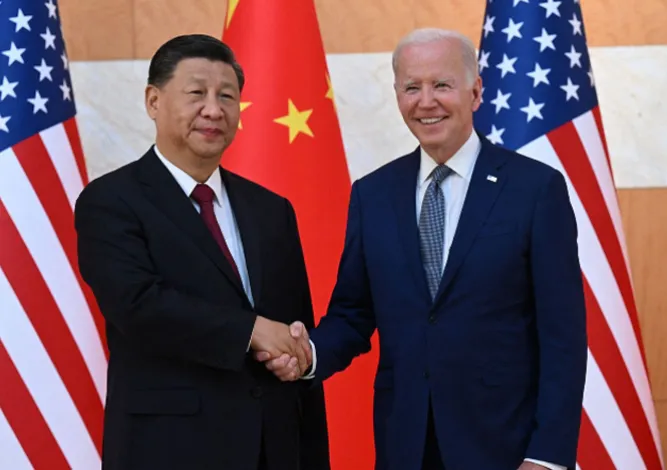-
CENTRES
Progammes & Centres
Location

This is part of the China Chronicles series - 154th essay
Whatever may be the imperfections of the Chinese leadership, one aspect they deliver upon is to spring a surprise when least expected. In 1955, Chairman Mao Zedong was secretly conferring with the United States (US) at a time when China supported the fraternal North Vietnamese regime in fighting their southern compatriots who had aligned with the US. After the Tiananmen Square Incident in 1989, when the general belief was that economic reforms in China had been grounded, Deng Xiaoping hit the road with his ‘Southern Tour’, which unambiguously drove home the point that China was back in business. In the same league lies Chinese President Xi Jinping’s trip to the US for the Asia-Pacific Economic Cooperation (APEC) summit over which there was intense speculation until the last minute.
This is Xi’s first journey to the US post the pandemic, and it comes amid tensions over trade, intensifying technological contestation, tensions in the South China Sea and over Taiwan. The summit between US President Joe Biden and Xi, on 15 November, builds on the need felt by the American establishment to construct “guardrails” in their relationship so that their contest does not degenerate into conflict. This is borne by the beliefs that economic uncertainties at home will temper China’s aggression abroad and that an engaged China, rather than an estranged one, will help in untangling intractable international disputes.
Beijing perhaps feels the need to re-engage with the US, which has been trying to reduce its economic interdependence. Having wagered his political capital on securing an unprecedented third term in high office, Xi’s continuance rests on his ability to deliver a strong and prosperous China by 2049.
Beijing perhaps feels the need to re-engage with the US, which has been trying to reduce its economic interdependence.
In the Biden era, the focus is on ‘de-risking
However, the Chinese assessment of the West’s de-risking campaign is best summarised by the articulation by China’s Central National Security Commission that there is a difficult situation with respect to national security, and that the Party-state must prepare to face “worst-case scenarios”. Li Wei from the China Institute of Contemporary International Relations has said that this means China faces challenges from “unilateral trade protection”.
A commentary in the Chinese state media has rejected the construct of competition in the Sino-US dynamics, stating that if the relationship is dominated by competition then the slide into confrontation and a cold war is inevitable. It elaborates that the American conceptualisation that sees China as a “systemic challenge” and the “most-serious competitor” has consequently spurred it to see this competition from an “ideological lens”, referring to the Biden administration’s framework of pitting democracies and autocrats. Instead, another Xinhua article rationalises that given how both economies are intertwined in complex ways, they can’t afford the consequences of misinterpreting each other’s intentions. Instead, China proposes that given the enormity of the world, it would be more prudent for both to “accommodate (each other’s) development” and “mutual prosperity”. Xi’s message to his American audience echoed this sentiment as he stated that China’s rise is intrinsically peaceful and that it does not intend to challenge the US or replace it. He also asserted that China had not initiated any conflict or occupied the territory of other nations, stating that China had gained most from the current international order and was ready to defend it. Now contrast this with the narrative peddled by the Communist Party of China’s official newspaper during the BRICS summit, which decried the same international order as an anachronism of a bygone era that was responsible for much of the blight and inequity in the Global South. It posited that China’s development initiatives and lending institutions were more egalitarian, thus, implying that China was promoting the development of an international order that is just and equitable. A few months ago, Xi was pushing hard to consolidate a rival international framework that meant investing more in multilateral blocs like BRICS and Shanghai Cooperation Organization (SCO) associated with China, skipping important diplomatic engagements like the G20 summit in New Delhi. This newfound confidence to project influence abroad seemed to emanate from the supposed superiority of the Communist Party’s system of governance.
India will have to keep an eye out for how its Quad partners hedge their bets with respect to China.
If China has gained so much from the international order, then does Xi’s assertion suggest that his nation is still reliant on it? On its own admission, three critical ingredients—exports to the US, Western technology, and capital had propelled China’s rise as the world’s second-largest economy. Does this sudden denouement mean Xi miscalculated his lunge for global leadership? But can the US or the world take a sobered-down Xi at face value? Conversely, is it a ‘biding your time’ redux, where China seeks more time to build its military and economic muscle to mount a more effective challenge to the global order at a time of its picking? Second, even as Xi smokes a peace pipe on US soil, the Chinese Coast Guard browbeat Filipino vessels sent to restock a beached ship in the South China Sea. It may be recalled that China reclaimed features in the South China Sea and militarised them despite the backlash. China’s brinksmanship perhaps tests American power that is already grappling with the Russo-Ukraine conflict and the Israel-Hamas war. In that case, is the proposition put forth by China to “accommodate (each others’) development” and that “common interests of both nations should be emphasised” a signal to the US that it will respect American interests elsewhere if it cedes Asia as a Chinese sphere of influence? Lastly, and more importantly for India, what does China imply when it says that the “Indo-Pacific strategy of the US that seeks to make regional powers pick sides is getting unpopular”? The Biden-Xi summit was preceded by Australian Prime Minister Anthony Albanese’s visit to Beijing in a bid to mend strained ties. Japanese PM Fumio Kishida has also met Xi, pledging to improve bilateral ties and announcing new talks on trade. Plans are afoot to resume the China-Japan-South Korea trilateral. India will have to keep an eye out for how its Quad partners hedge their bets with respect to China.
Kalpit A Mankikar is a Fellow with the Strategic Studies programme at the Observer Research Foundation
The views expressed above belong to the author(s). ORF research and analyses now available on Telegram! Click here to access our curated content — blogs, longforms and interviews.

Kalpit A Mankikar is a Fellow with Strategic Studies programme and is based out of ORFs Delhi centre. His research focusses on China specifically looking ...
Read More +